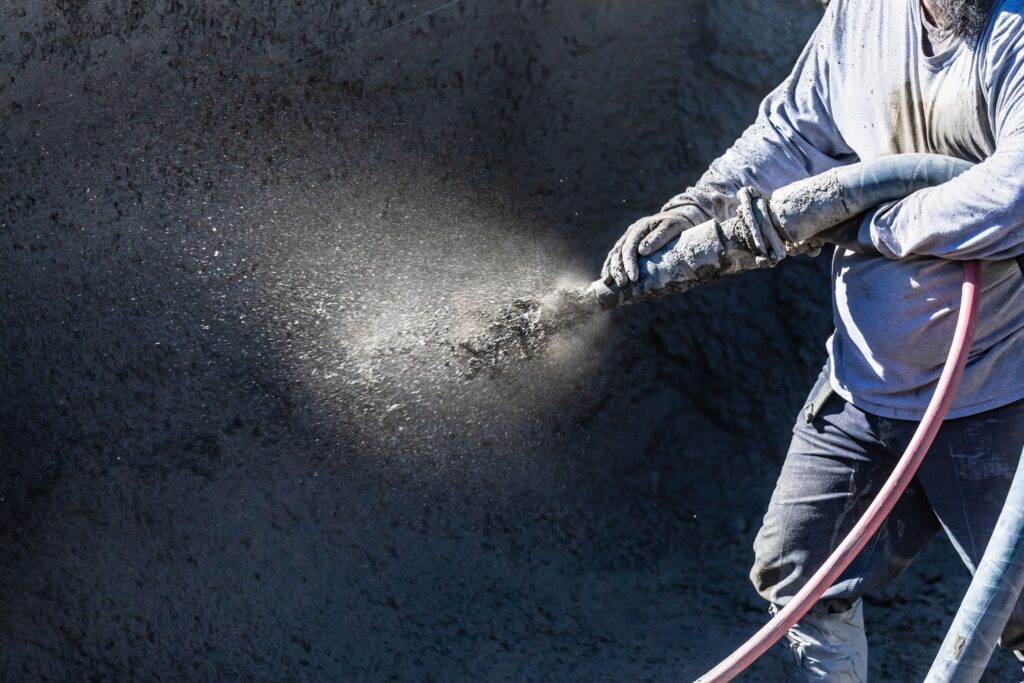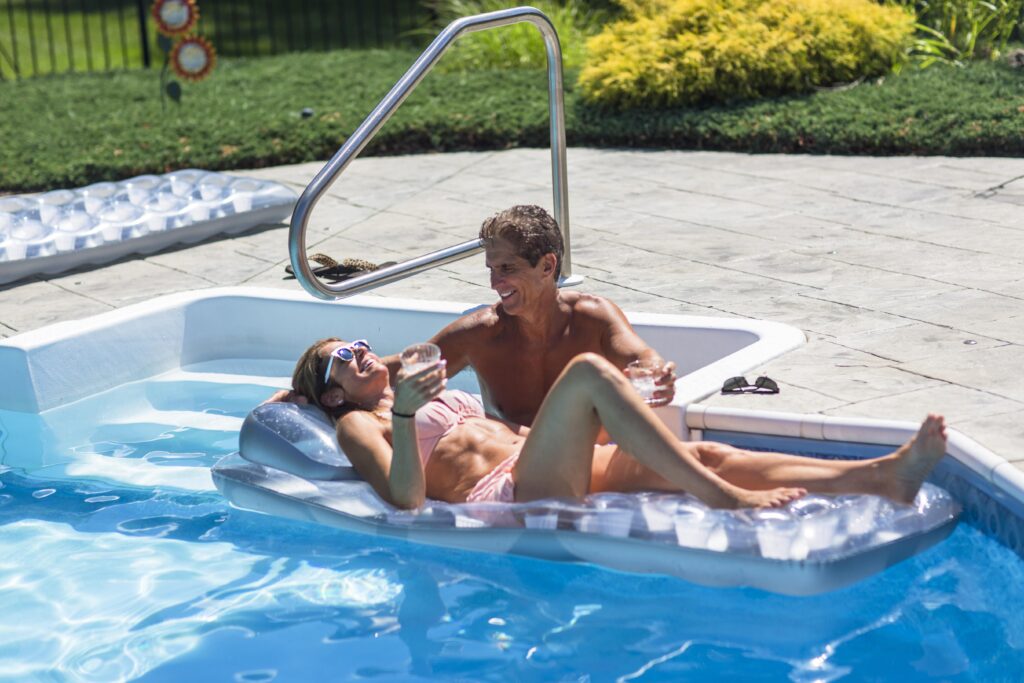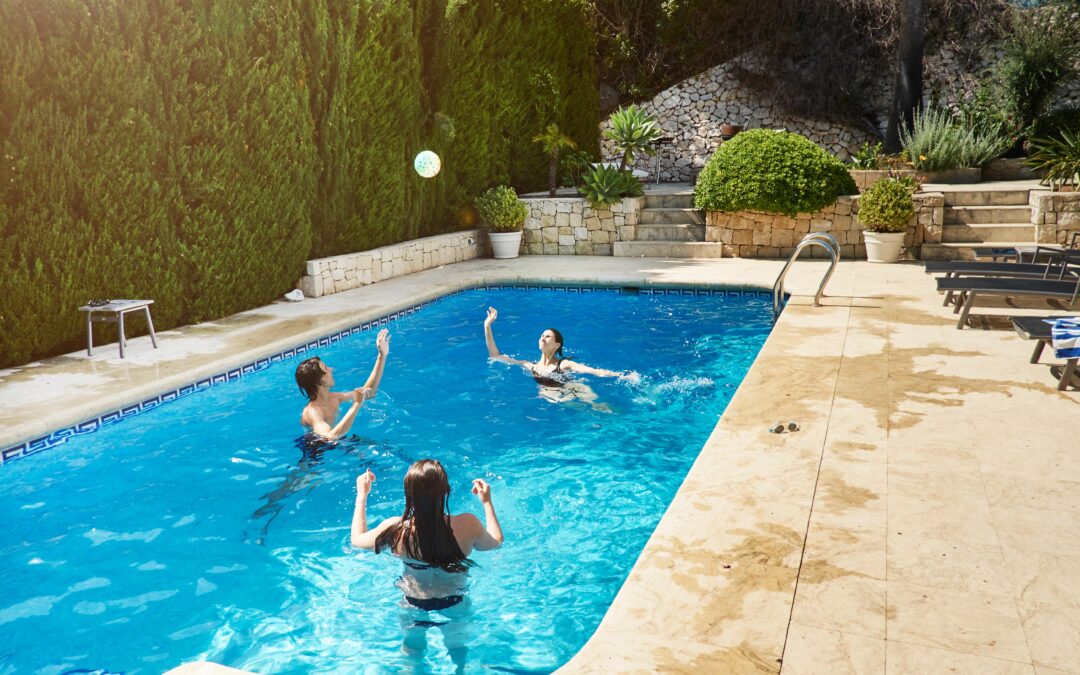When planning a backyard transformation, one of the biggest decisions is choosing between a gunite or fiberglass pool. This choice isn’t just about looks—it affects durability, customization options, cost, and maintenance requirements.
At SSG Pools, we’ve been building custom inground pools for over 50 years. As the largest gunite pool builder in New England, we’ve helped thousands of homeowners navigate this exact decision. Here’s how it works.
What Is a Gunite Pool?

Gunite pools are constructed with a steel rebar frame that’s sprayed with a concrete and sand mix. Once cured, it forms an incredibly strong, durable structure that can be finished with plaster, tile, or aggregate.
Why Homeowners Choose Gunite
- Maximum design flexibility—any shape or depth
- Longer lifespan with proper maintenance
- High-end finish options
If you’re looking for a one-of-a-kind design that integrates into the natural flow of your backyard, gunite may be the best option. It’s ideal for custom water features, vanishing edges, and integrated spas.
What Is a Fiberglass Pool?

Fiberglass pools are pre-manufactured shells made from reinforced plastic that are delivered to your site in one piece and lowered into a prepared excavation.
Fiberglass Benefits
- Faster installation—usually within a few weeks
- Smooth gel coat finish is algae-resistant
- Lower maintenance in the short term
These pools offer convenience, especially for those on tighter timelines. However, design options are limited to the shapes and sizes offered by manufacturers.
Gunite vs Fiberglass Pools: Head-to-Head
1. Customization
Gunite wins here. If you want a pool shaped like a lagoon or designed around a slope, gunite gives you total control. Fiberglass options are limited to the molds available.
2. Installation Time
Fiberglass pools have the edge in speed. They can be installed in as little as 2–3 weeks. Gunite pools take longer due to onsite construction and curing time.
3. Durability and Longevity
Gunite pools are known for their strength and longevity. Fiberglass pools resist cracking but may eventually fade or blister over time, especially in harsh climates.
4. Maintenance
Fiberglass pools require less maintenance due to their smooth, nonporous surface. Gunite pools, while durable, need regular brushing and occasional resurfacing.
5. Cost
Initial installation costs are generally higher for gunite pools due to their custom nature. But long-term value often outweighs the up-front investment.
When to Choose Gunite
If you want a fully custom pool that’s built to last, gunite is often the best option. It gives you the flexibility to design exactly what you want—down to the inch. At SSG Pools, we specialize in complex builds and deliver a turn-key experience from concept to completion.
When to Choose Fiberglass
If speed and convenience are top priorities, fiberglass may be worth considering. It’s also a smart choice if you prefer a more hands-off maintenance schedule.
Frequently Asked Questions
What is the difference between gunite and fiberglass pools?
Gunite pools are constructed onsite with concrete and allow full customization. Fiberglass pools are pre-made shells that are installed quickly but have limited design options.
Are gunite pools more expensive than fiberglass?
Gunite pools generally cost more to install but offer greater design flexibility and a longer lifespan.
How long do fiberglass pools last?
Fiberglass pools typically last 25–30 years with proper maintenance, though finishes may require updates over time.
Can a gunite pool be built in any shape?
Yes. One of the main advantages of gunite is that it can be shaped and sized to fit virtually any design vision.
What is the best type of pool for cold climates?
Gunite pools are well-suited for colder climates due to their structural integrity and resistance to shifting soil.

